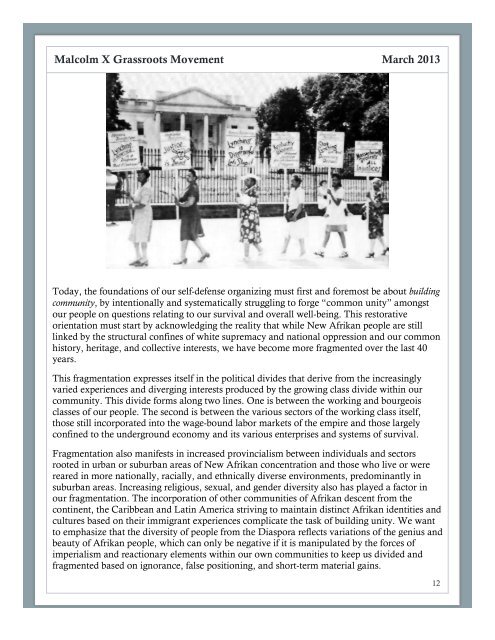MXGM Self-Defence Manual
MXGM Self-Defence Manual
MXGM Self-Defence Manual
You also want an ePaper? Increase the reach of your titles
YUMPU automatically turns print PDFs into web optimized ePapers that Google loves.
;<br />
Malcolm X Grassroots Movement March 2013<br />
Today, the foundations of our self-defense organizing must first and foremost be about building<br />
community, by intentionally and systematically struggling to forge “common unity” amongst<br />
our people on questions relating to our survival and overall well-being. This restorative<br />
orientation must start by acknowledging the reality that while New Afrikan people are still<br />
linked by the structural confines of white supremacy and national oppression and our common<br />
history, heritage, and collective interests, we have become more fragmented over the last 40<br />
years.<br />
This fragmentation expresses itself in the political divides that derive from the increasingly<br />
varied experiences and diverging interests produced by the growing class divide within our<br />
community. This divide forms along two lines. One is between the working and bourgeois<br />
classes of our people. The second is between the various sectors of the working class itself,<br />
those still incorporated into the wage-bound labor markets of the empire and those largely<br />
confined to the underground economy and its various enterprises and systems of survival.<br />
Fragmentation also manifests in increased provincialism between individuals and sectors<br />
rooted in urban or suburban areas of New Afrikan concentration and those who live or were<br />
reared in more nationally, racially, and ethnically diverse environments, predominantly in<br />
suburban areas. Increasing religious, sexual, and gender diversity also has played a factor in<br />
our fragmentation. The incorporation of other communities of Afrikan descent from the<br />
continent, the Caribbean and Latin America striving to maintain distinct Afrikan identities and<br />
cultures based on their immigrant experiences complicate the task of building unity. We want<br />
to emphasize that the diversity of people from the Diaspora reflects variations of the genius and<br />
beauty of Afrikan people, which can only be negative if it is manipulated by the forces of<br />
imperialism and reactionary elements within our own communities to keep us divided and<br />
fragmented based on ignorance, false positioning, and short-term material gains.<br />
12


